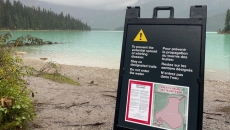British Columbia has finalized regulations to provide a minimum-wage and basic protections for ride-hailing and delivery workers using app-based platforms such as Uber, DoorDash and SkipTheDishes.
The Ministry of Labour says in a statement the regulations that will take effect on Sept. 3 are a first in Canada.
It says the changes are the result of years of engagement with various stakeholders, and they address workers' top concerns, including low and unpredictable pay, tip protection and lack of workers' compensation.
The new rules set the minimum wage for the time a worker is engaged in a job at $20.88 per hour, 20 per cent higher than B.C.'s general minimum wage.
The province says the rationale for adding the premium is that the minimum wage does not apply to the workers' time spent waiting between assignments.
The rules will also ensure 100 per cent of customers' tips go to the worker and establish a 35- to 45-cent minimum per-kilometre vehicle allowance to help workers cover their expenses, as well as coverage through B.C.'s workers' compensation agency.
The regulations will also require platforms to show workers the locations and estimated pay for a particular job before they accept it, and the companies must provide a reason if a worker is suspended or terminated from their position.
Labour Minister Harry Bains says companies should be providing fairness measures for their app-based workers.
"Everyone working hard to support their families should have basic protections so if they're injured on the job, they won't lose their homes," he says in a statement.
"That is what we are doing with these regulations — providing fair pay and basic protections for these workers."
The B.C. government estimates there are about 11,000 ride-hailing drivers and 35,000 delivery workers in the province.
That's who the rules apply to, the province says, noting they don't apply to other types of gig workers, such as freelance writers, musicians or dog walkers.
The government says it will share the final regulations in the coming days.
The statement issued Wednesday says companies must top up the difference in workers' earnings if they don't meet the new standard for "engaged time." Tips are not included in the minimum earnings calculation, it adds.
The province says the companies operating the ride-hailing and delivery platforms will be responsible for registering for coverage with WorkSafeBC and paying premiums, as well as reporting injuries and investigating significant incidents.
The president of the Greater Vancouver Board of Trade responded to the announcement with a statement saying they're concerned the changes will "impose additional burdens and reduce flexibility" for businesses operating in the province.
"Companies in B.C. already contend with some of the highest costs and strictest regulatory and tax environments in North America," Bridgitte Anderson says.
Still, she says guaranteeing a minimum wage is a "positive" measure.
"We will continue to advocate for a balanced approach that safeguards workers while preserving the flexibility, independence and supplementary income opportunities inherent in gig work," her statement says.






